COVID-19 / In-Depth Science Review: December 19, 2020 – January 8, 2021
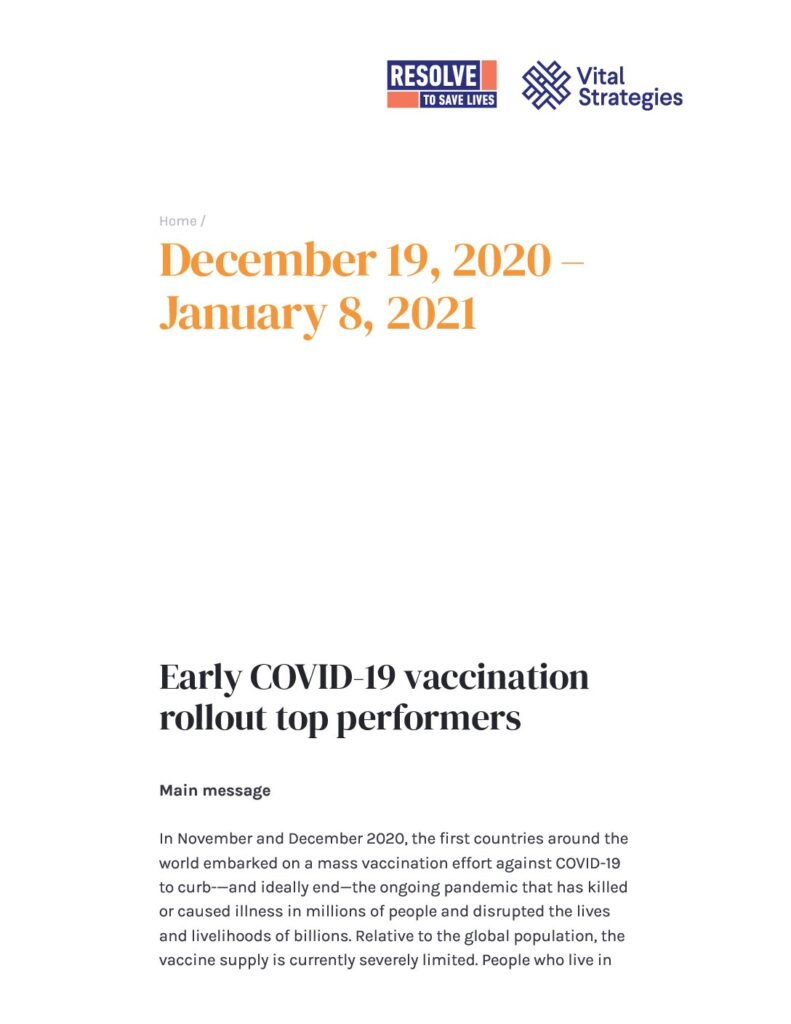
Early COVID-19 vaccination rollout top performers This science review is a snapshot of the new and emerging scientific evidence related to COVID-19 during the period specified. It is a review of important topics and articles, not a guide for policy or program implementation. The findings captured are subject to change as new information is made available.
Protecting Health Care Workers: A Need for Urgent Action

Our report details the problems affecting our health care workforce and key actions that governments, health systems and funders must take to address them.
How do local-level authorities engage in epidemic and pandemic preparedness activities and coordinate with higher levels of government? Survey results from 33 cities
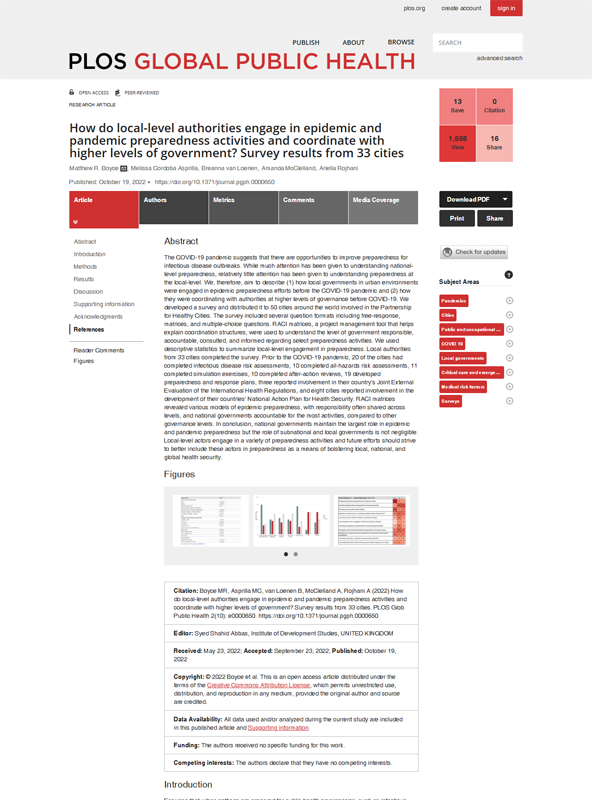
Engaging local governments in epidemic preparedness will strengthen global health security by ensuring better coordination between local and national authorities. Writing in PLOS Global Public Health, Resolve to Save Lives and partners explore local-level involvement in epidemic preparedness before the COVID-19 pandemic. The research, based on responses from 33 cities in the Partnership for Healthy […]
COVID-19 / In-Depth Science Review: December 12 – 18, 2020
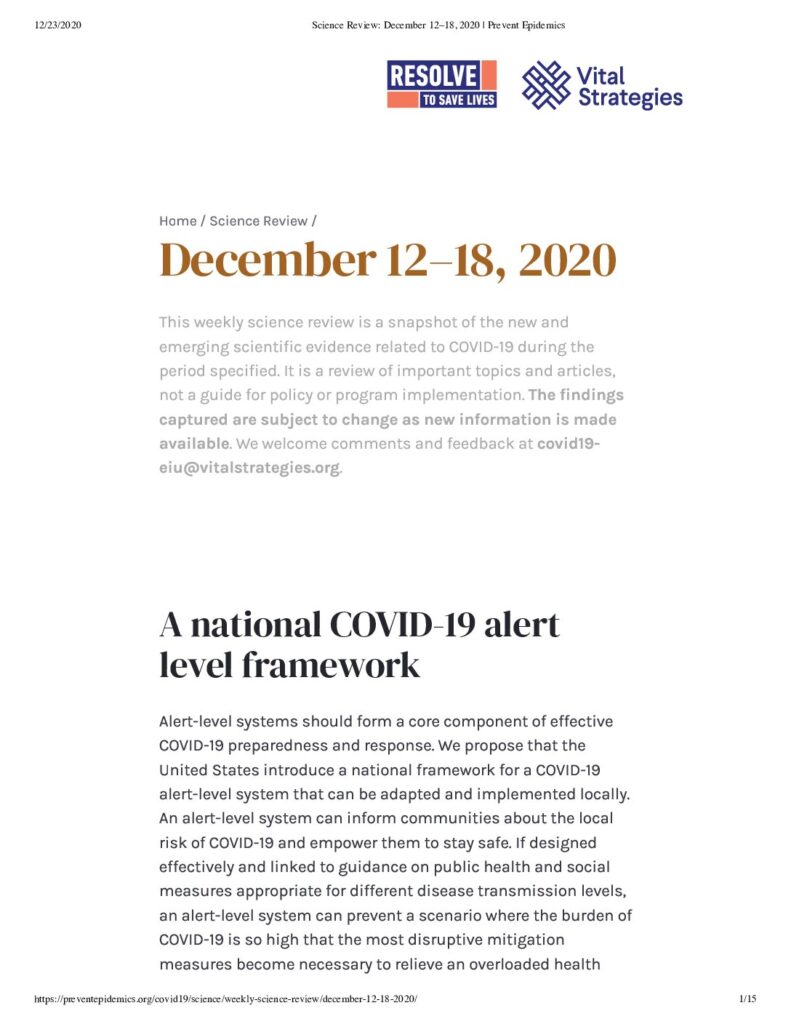
A national COVID-19 alert level framework This science review is a snapshot of the new and emerging scientific evidence related to COVID-19 during the period specified. It is a review of important topics and articles, not a guide for policy or program implementation. The findings captured are subject to change as new information is made available.
COVID-19 / In-Depth Science Review: December 5 – 11, 2020
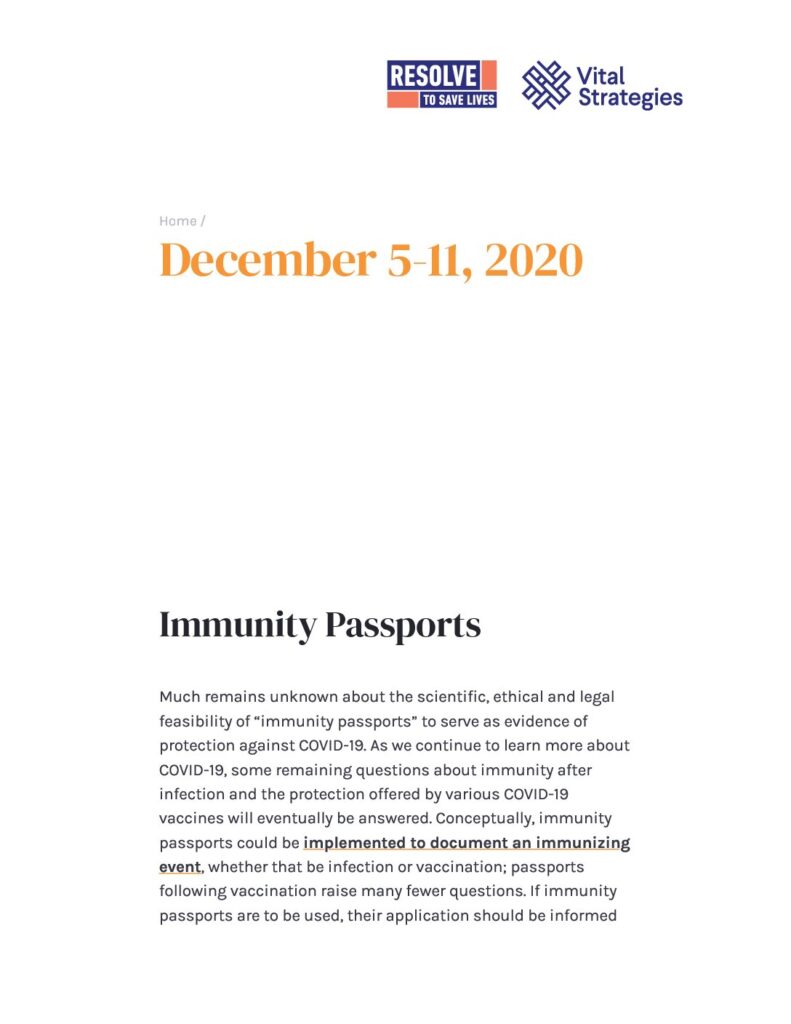
Immunity Passports This science review is a snapshot of the new and emerging scientific evidence related to COVID-19 during the period specified. It is a review of important topics and articles, not a guide for policy or program implementation. The findings captured are subject to change as new information is made available.
COVID-19 / In-Depth Science Review: November 14 – December 4, 2020
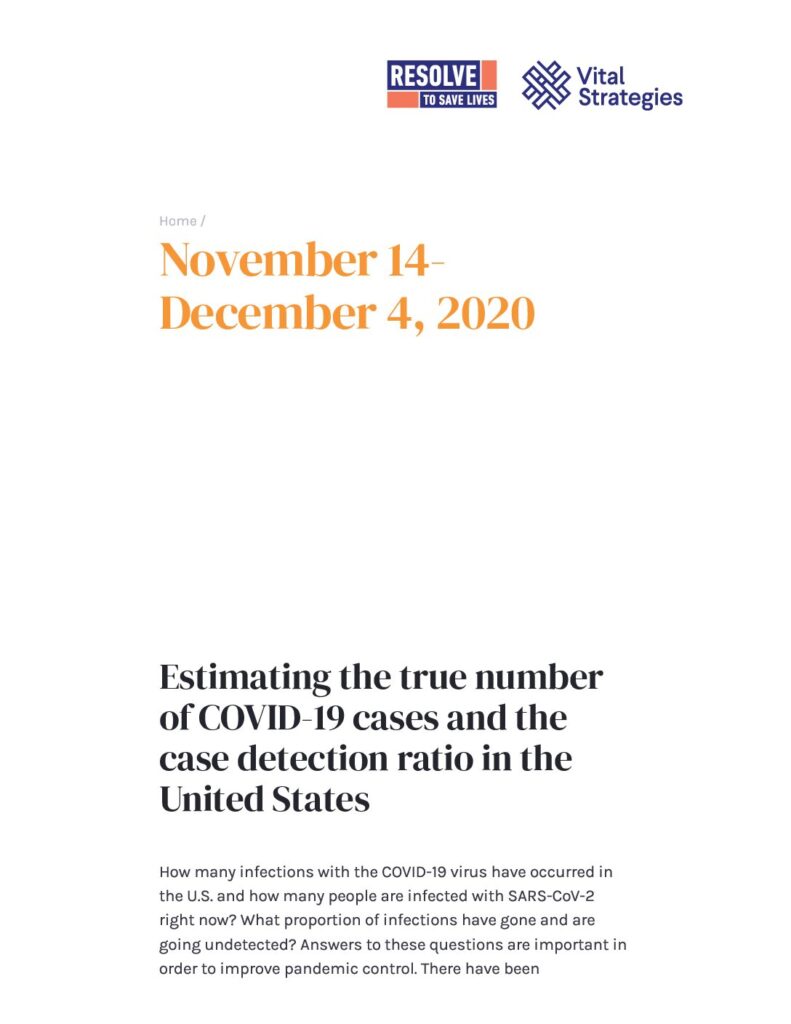
Estimating the true number of COVID-19 cases and the case detection ratio in the United States This science review is a snapshot of the new and emerging scientific evidence related to COVID-19 during the period specified. It is a review of important topics and articles, not a guide for policy or program implementation. The findings captured […]
COVID-19 / In-Depth Science Review: November 7 – 13, 2020
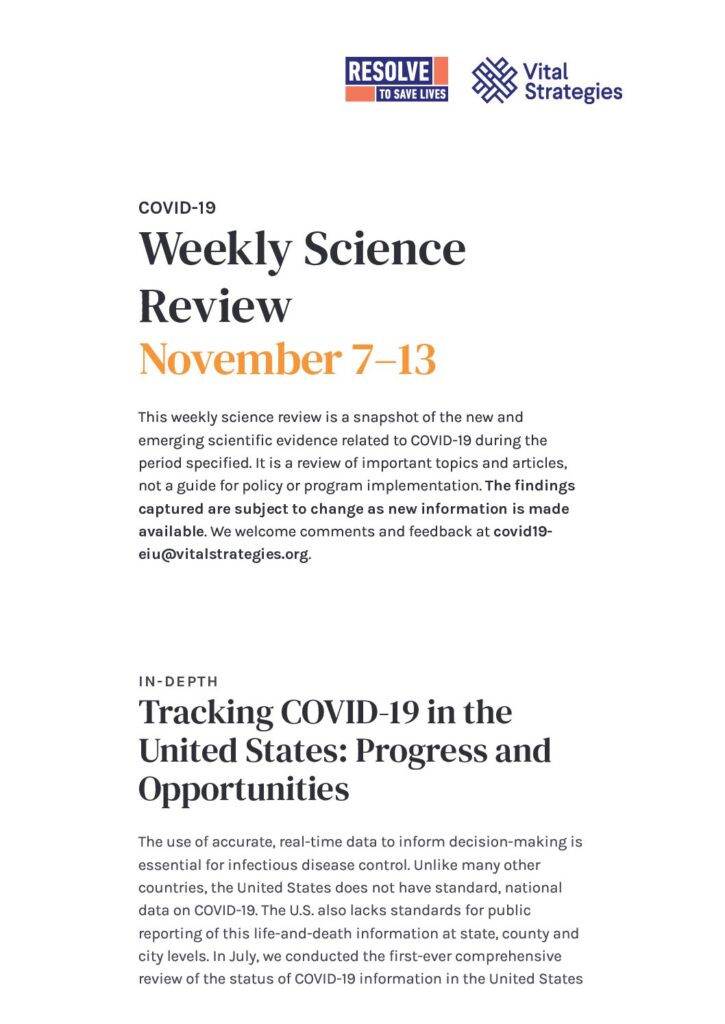
Tracking COVID-19 in the United States: Progress and Opportunities This science review is a snapshot of the new and emerging scientific evidence related to COVID-19 during the period specified. It is a review of important topics and articles, not a guide for policy or program implementation. The findings captured are subject to change as new information […]
COVID-19 / In-Depth Science Review: October 31 – November 6, 2020

Declining death rates among people severely ill with COVID-19 This science review is a snapshot of the new and emerging scientific evidence related to COVID-19 during the period specified. It is a review of important topics and articles, not a guide for policy or program implementation. The findings captured are subject to change as new information […]
COVID-19 / In-Depth Science Review: October 10 – 30, 2020
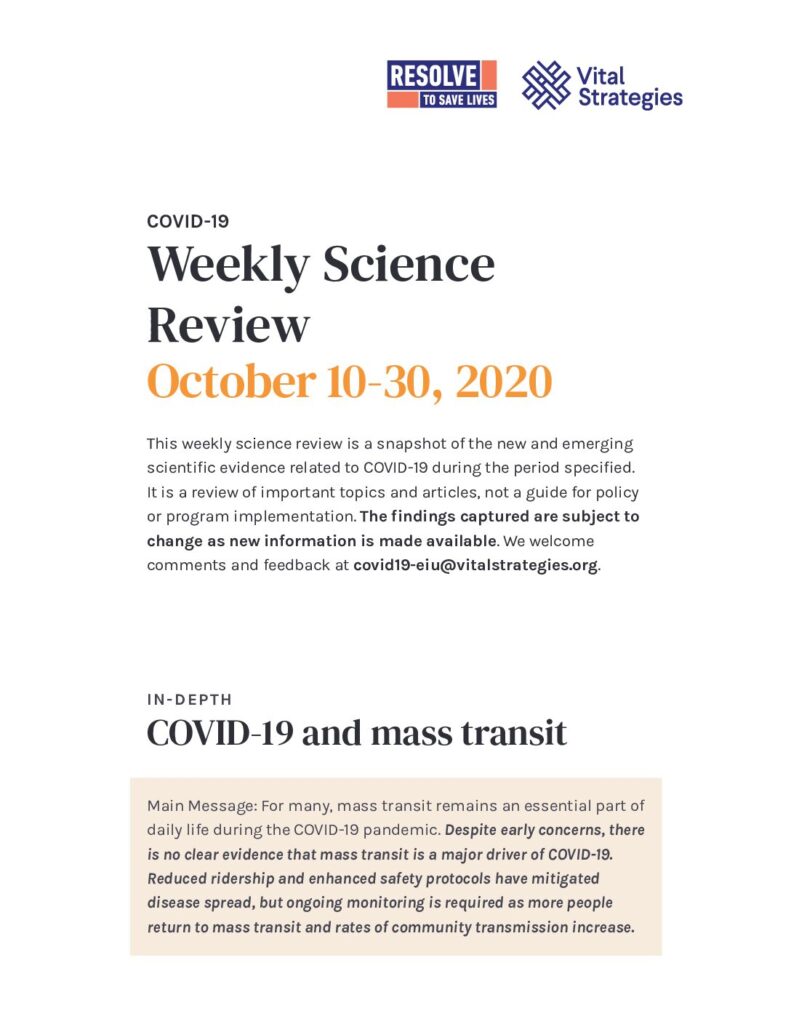
COVID-19 and mass transit This science review is a snapshot of the new and emerging scientific evidence related to COVID-19 during the period specified. It is a review of important topics and articles, not a guide for policy or program implementation. The findings captured are subject to change as new information is made available.
COVID-19 / In-Depth Science Review: October 3 – 9, 2020
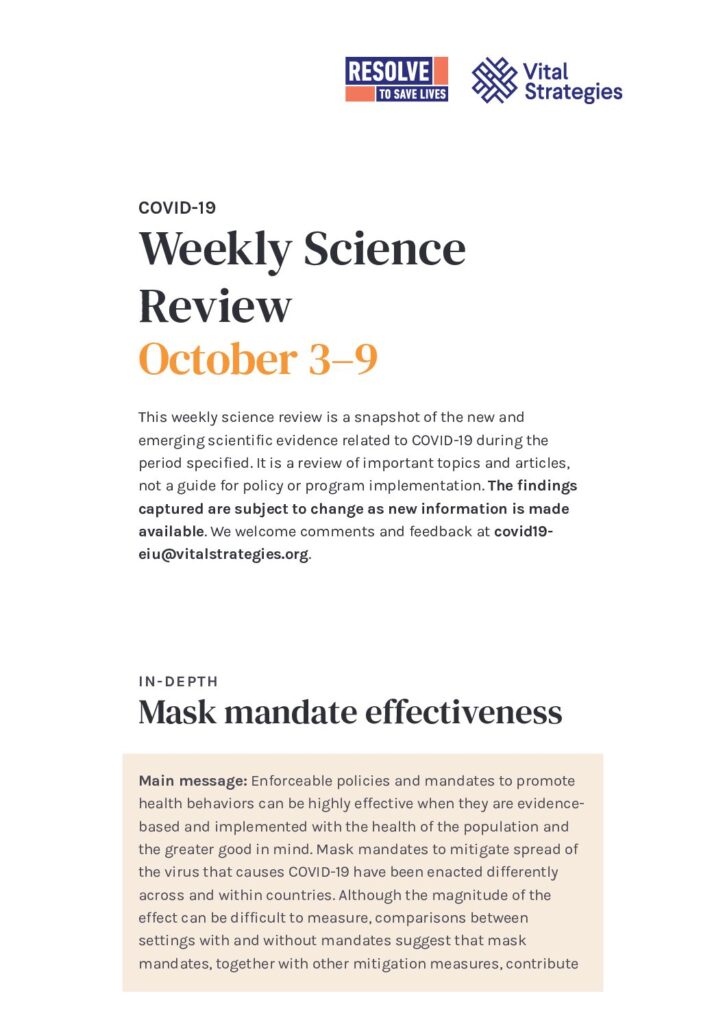
Mask mandate effectiveness This science review is a snapshot of the new and emerging scientific evidence related to COVID-19 during the period specified. It is a review of important topics and articles, not a guide for policy or program implementation. The findings captured are subject to change as new information is made available.
COVID-19 / In-Depth Science Review: September 26 – October 2, 2020
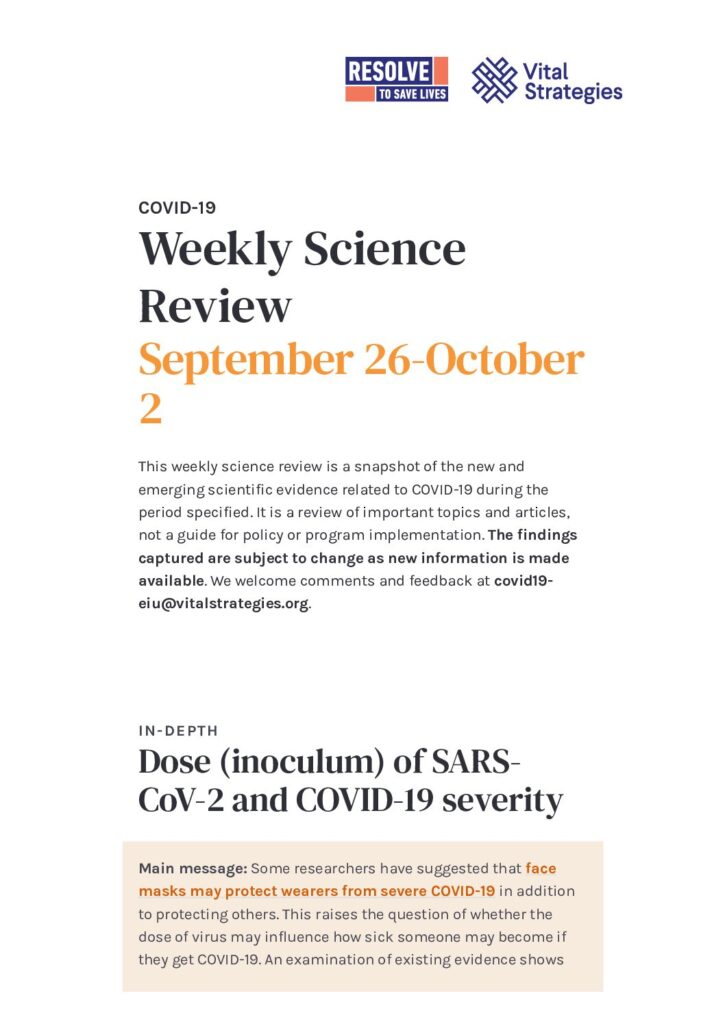
Dose (inoculum) of SARS-CoV-2 and COVID-19 severity
COVID-19 / In-Depth Science Review: September 19 – 25, 2020
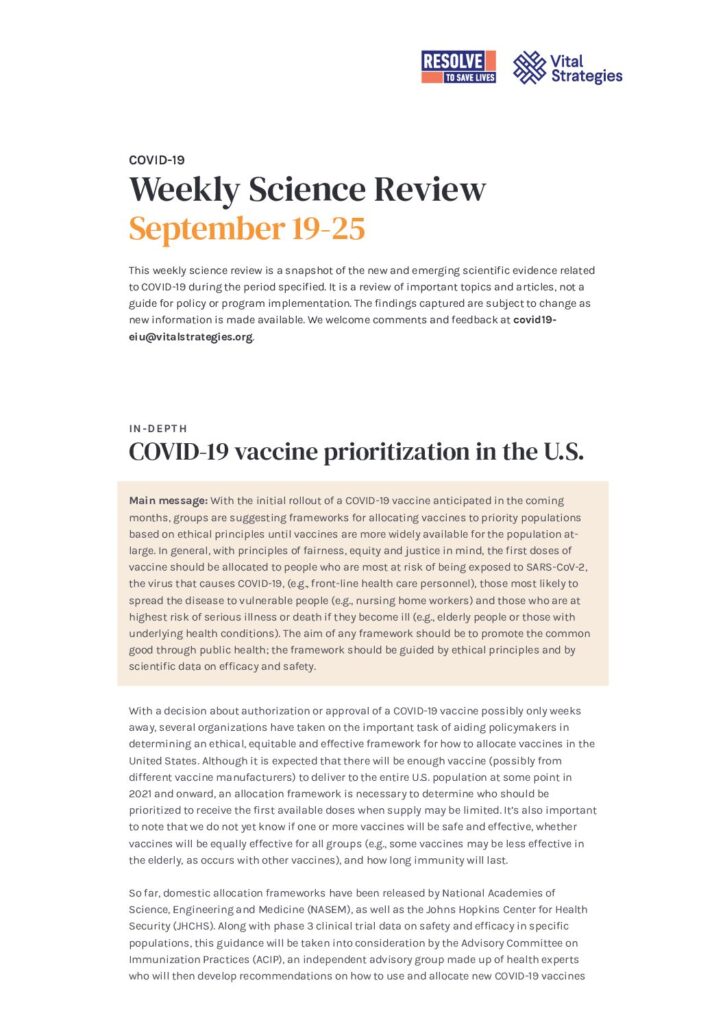
COVID-19 vaccine prioritization in the U.S. This science review is a snapshot of the new and emerging scientific evidence related to COVID-19 during the period specified. It is a review of important topics and articles, not a guide for policy or program implementation. The findings captured are subject to change as new information is made available.
COVID-19 / In-Depth Science Review: September 12 – 18, 2020
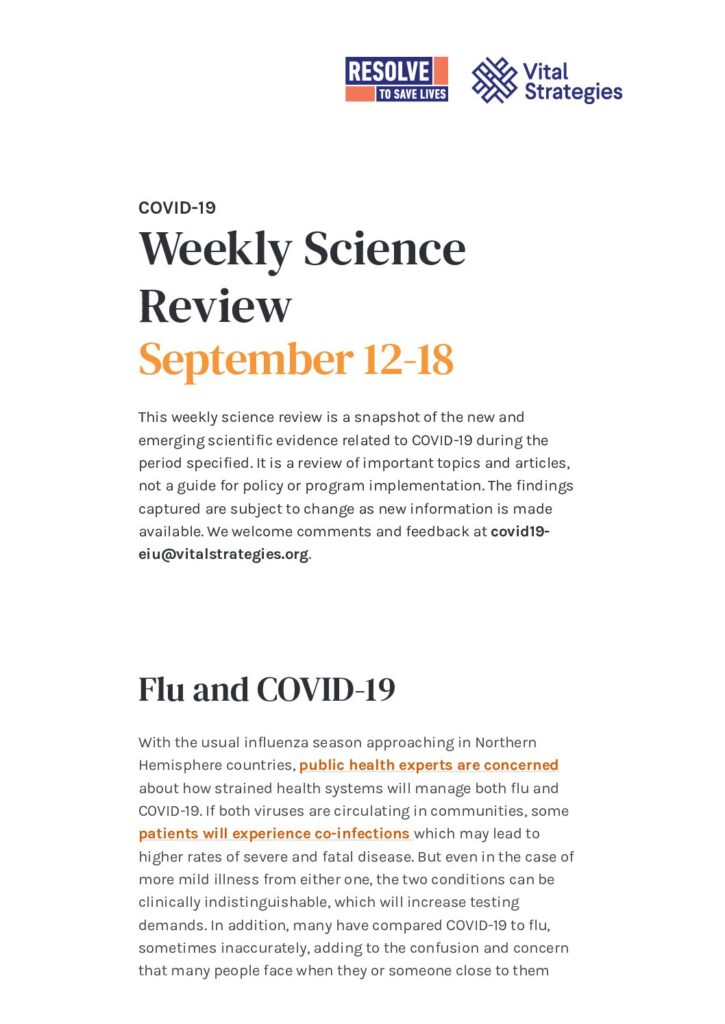
Flu and COVID-19 This science review is a snapshot of the new and emerging scientific evidence related to COVID-19 during the period specified. It is a review of important topics and articles, not a guide for policy or program implementation. The findings captured are subject to change as new information is made available.
COVID-19 / In-Depth Science Review: August 29 – September 11, 2020
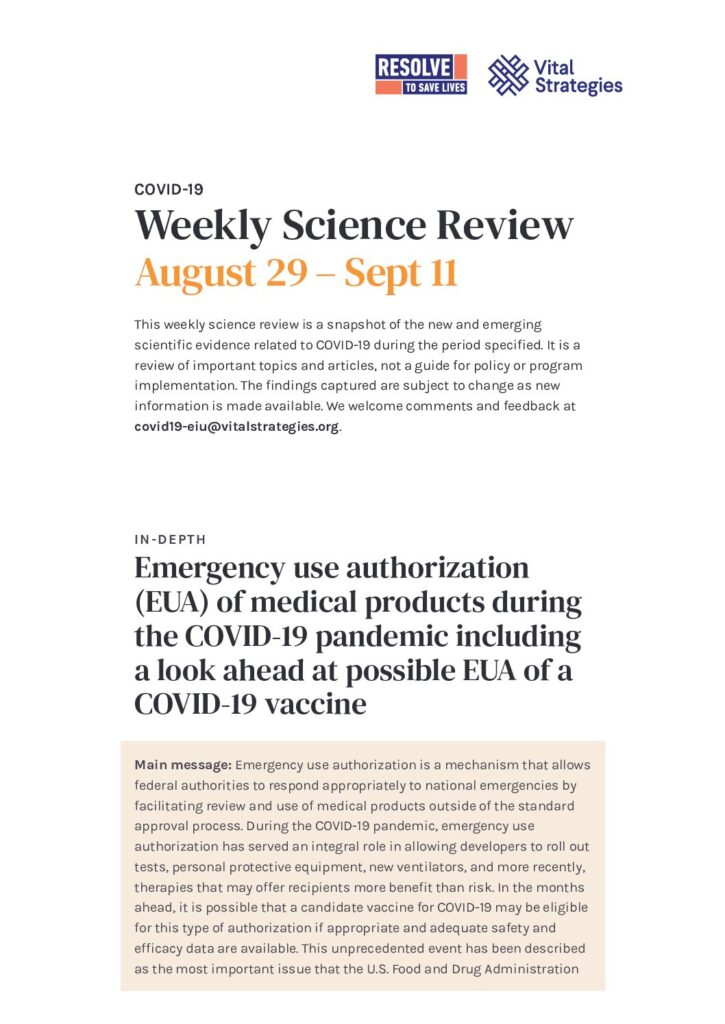
Emergency use authorization (EUA) of medical products during the COVID-19 pandemic including a look ahead at possible EUA of a COVID-19 vaccine. This science review is a snapshot of the new and emerging scientific evidence related to COVID-19 during the period specified. It is a review of important topics and articles, not a guide for […]
COVID-19 / In-Depth Science Review: August 22 – 28, 2020
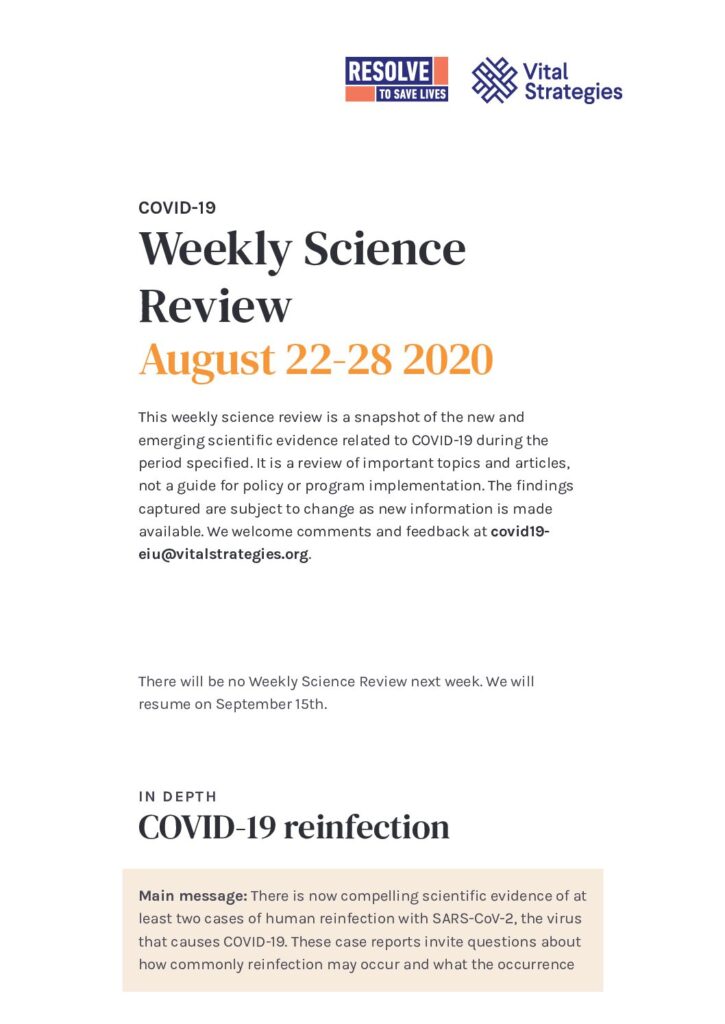
COVID-19 reinfection This science review is a snapshot of the new and emerging scientific evidence related to COVID-19 during the period specified. It is a review of important topics and articles, not a guide for policy or program implementation. The findings captured are subject to change as new information is made available.
COVID-19 / In-Depth Science Review: August 15 – 21, 2020
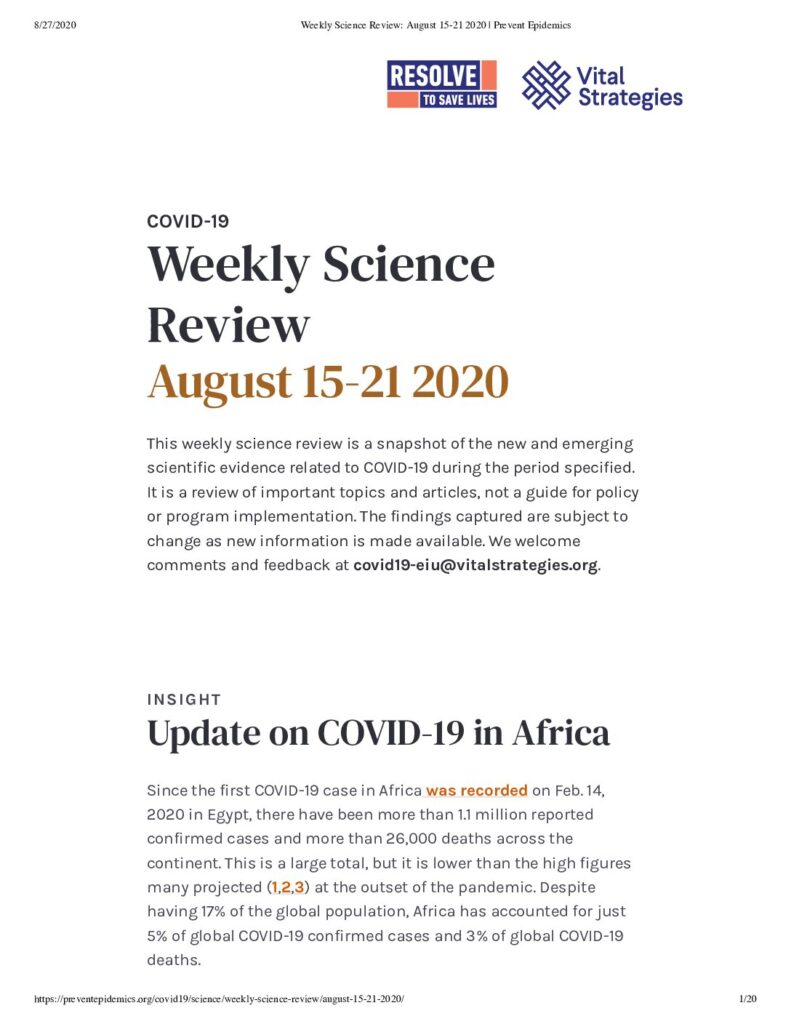
Update on COVID-19 in Africa This science review is a snapshot of the new and emerging scientific evidence related to COVID-19 during the period specified. It is a review of important topics and articles, not a guide for policy or program implementation. The findings captured are subject to change as new information is made available.
PERC Brief
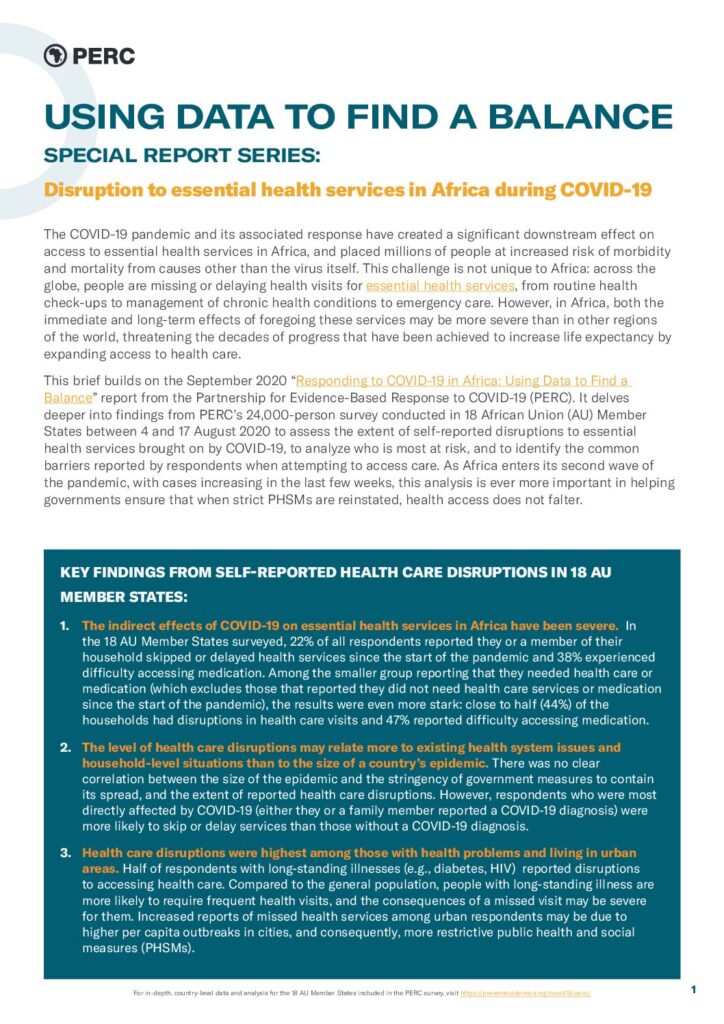
A brief from PERC’s 24,000-person survey conducted in 18 African Union (AU) Member States in August 2020 to assess disruptions to essential health services brought on by COVID-19.
COVID-19 / In-Depth Science Review: August 8 – 14, 2020

The indirect impacts of COVID-19 on health and essential health services in sub-Saharan Africa This science review is a snapshot of the new and emerging scientific evidence related to COVID-19 during the period specified. It is a review of important topics and articles, not a guide for policy or program implementation. The findings captured are subject […]
COVID-19 / In-Depth Science Review: August 1 – 7, 2020
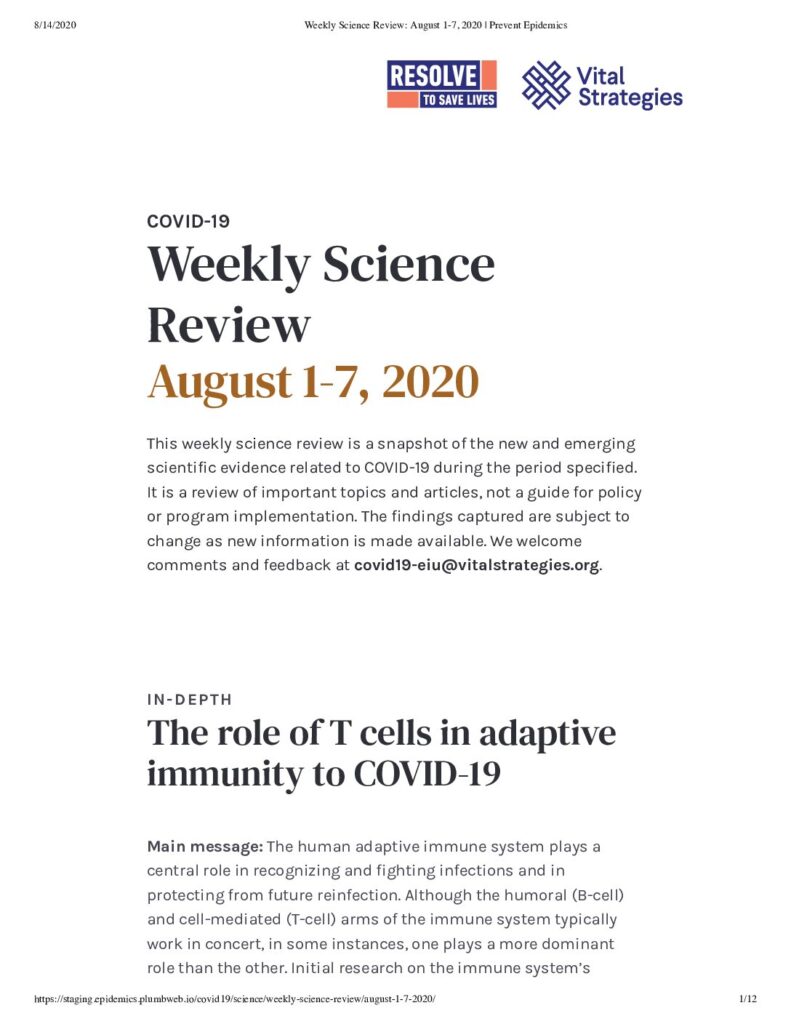
The role of T cells in adaptive immunity to COVID-19 This science review is a snapshot of the new and emerging scientific evidence related to COVID-19 during the period specified. It is a review of important topics and articles, not a guide for policy or program implementation. The findings captured are subject to change as new […]
COVID-19 / In-Depth Science Review: July 25 – 31, 2020
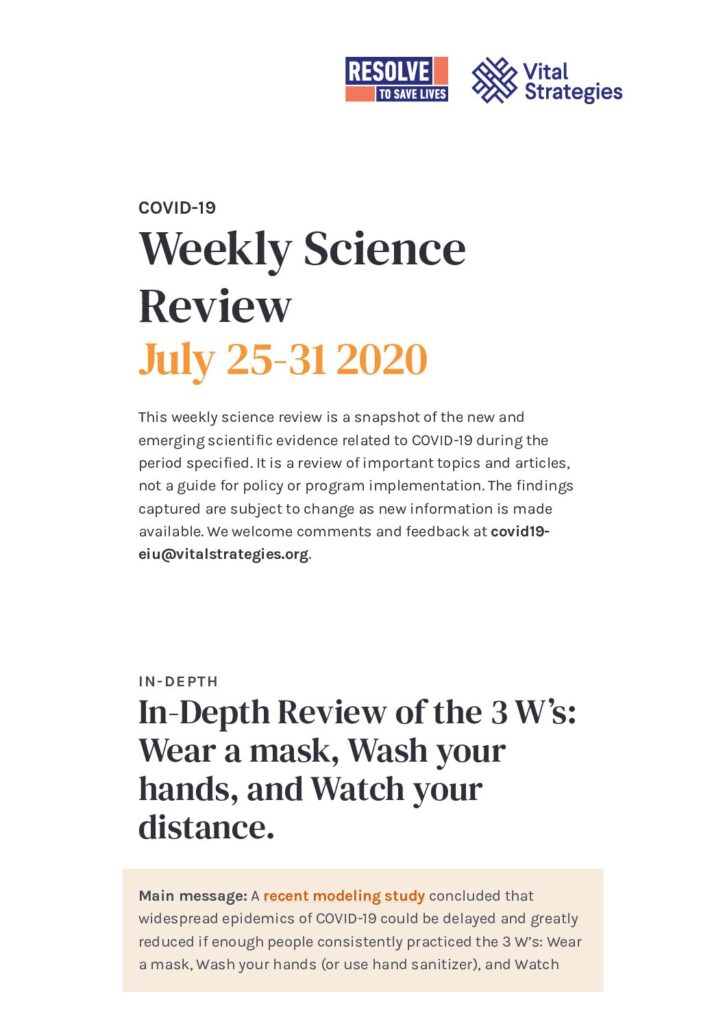
In-Depth Review of the 3 W’s: Wear a mask, Wash your hands, and Watch your distance. This science review is a snapshot of the new and emerging scientific evidence related to COVID-19 during the period specified. It is a review of important topics and articles, not a guide for policy or program implementation. The findings captured […]
COVID-19 / In-Depth Science Review: July 18 – 24, 2020
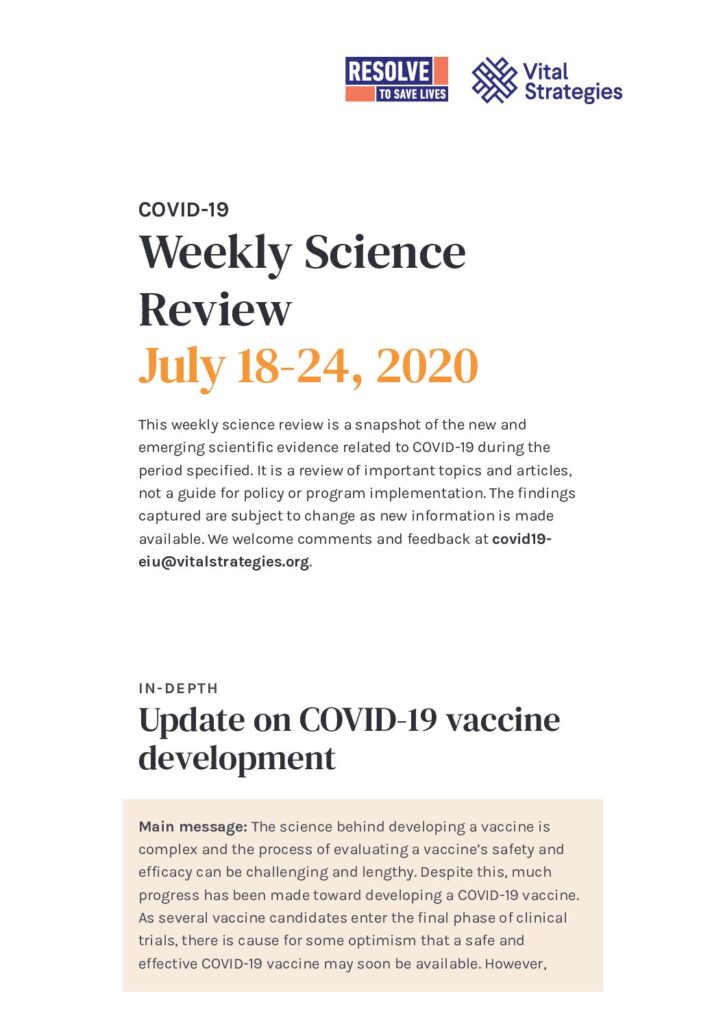
Update on COVID-19 vaccine development This science review is a snapshot of the new and emerging scientific evidence related to COVID-19 during the period specified. It is a review of important topics and articles, not a guide for policy or program implementation. The findings captured are subject to change as new information is made available.
COVID-19 / In-Depth Science Review: July 11 – 17, 2020
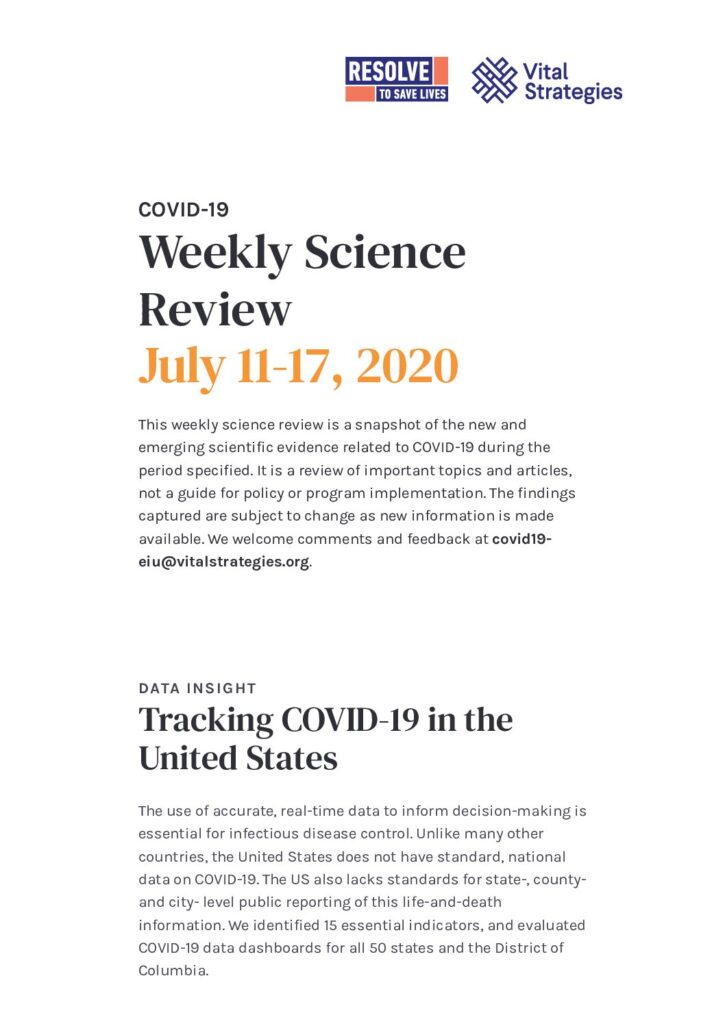
Tracking COVID-19 in the United States This science review is a snapshot of the new and emerging scientific evidence related to COVID-19 during the period specified. It is a review of important topics and articles, not a guide for policy or program implementation. The findings captured are subject to change as new information is made available.
COVID-19 / In-Depth Science Review: July 4 – 10, 2020
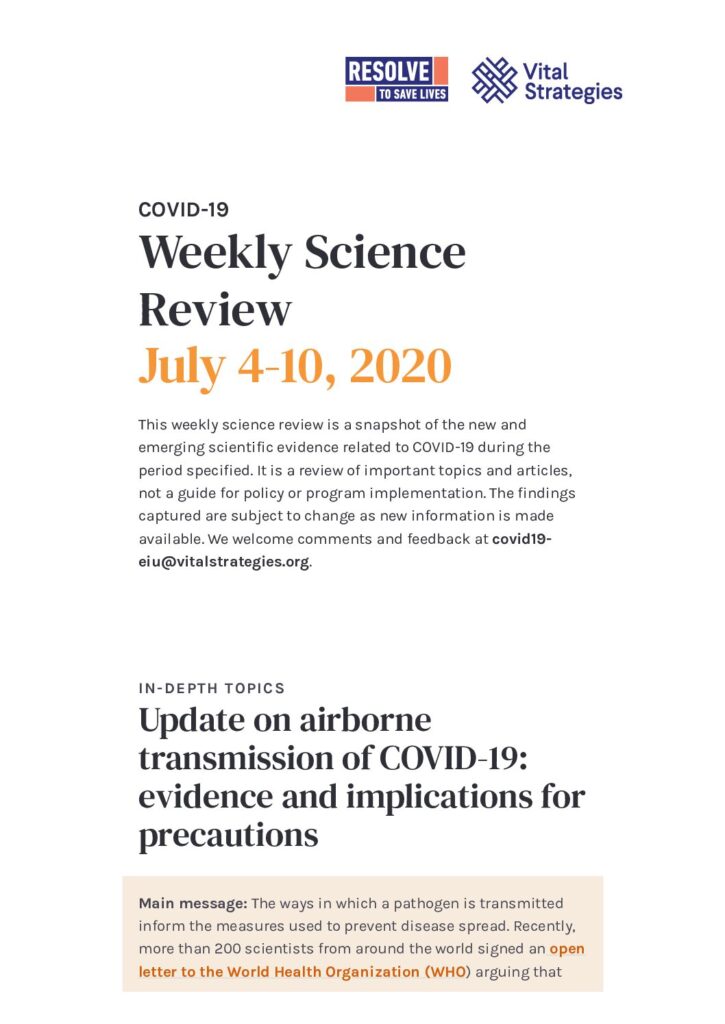
Update on airborne transmission of COVID-19: evidence and implications for precautions This science review is a snapshot of the new and emerging scientific evidence related to COVID-19 during the period specified. It is a review of important topics and articles, not a guide for policy or program implementation. The findings captured are subject to change as […]
COVID-19 / In-Depth Science Review: June 27 – July 3, 2020
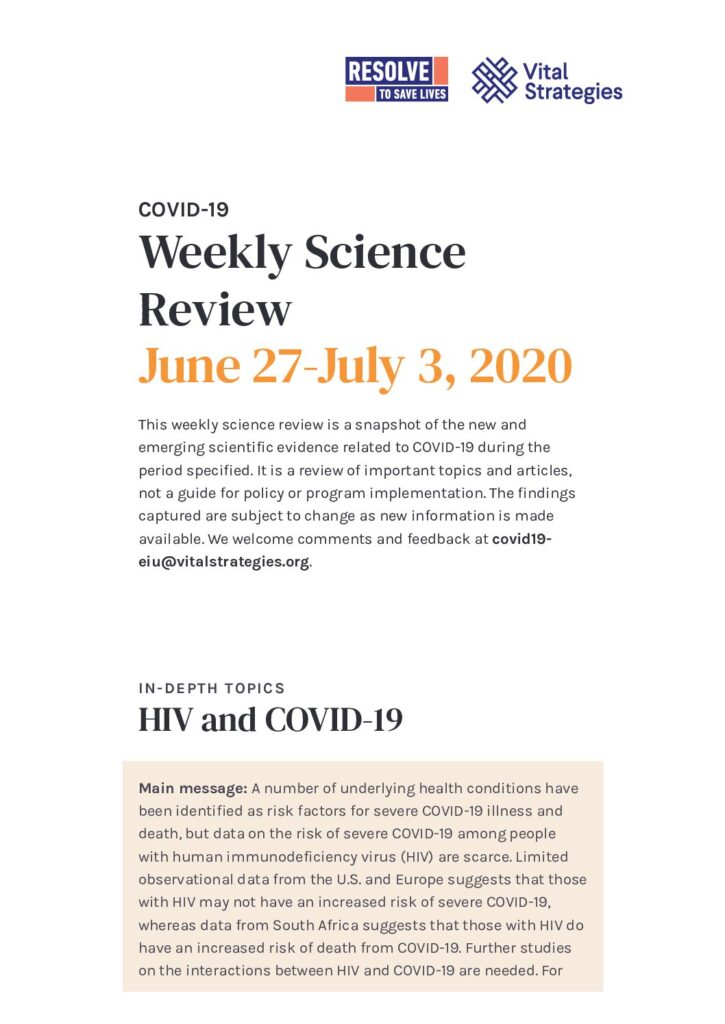
HIV and COVID-19 This science review is a snapshot of the new and emerging scientific evidence related to COVID-19 during the period specified. It is a review of important topics and articles, not a guide for policy or program implementation. The findings captured are subject to change as new information is made available.
Reducing Premature Mortality from Cardiovascular and Other Non-Communicable Diseases by One Third: Achieving Sustainable Development Goal Indicator 3.4.1

A paper authored by Resolve to Save Lives and Vital Strategies highlights how the world is not currently on track to reach its SDG 3.4.1 goal to reduce premature death from NCDs, but that it’s possible. Progress will require improvements to access to quality health care and medications and financial protections for health programs in […]
COVID-19 / In-Depth Science Review: June 20 – 26, 2020
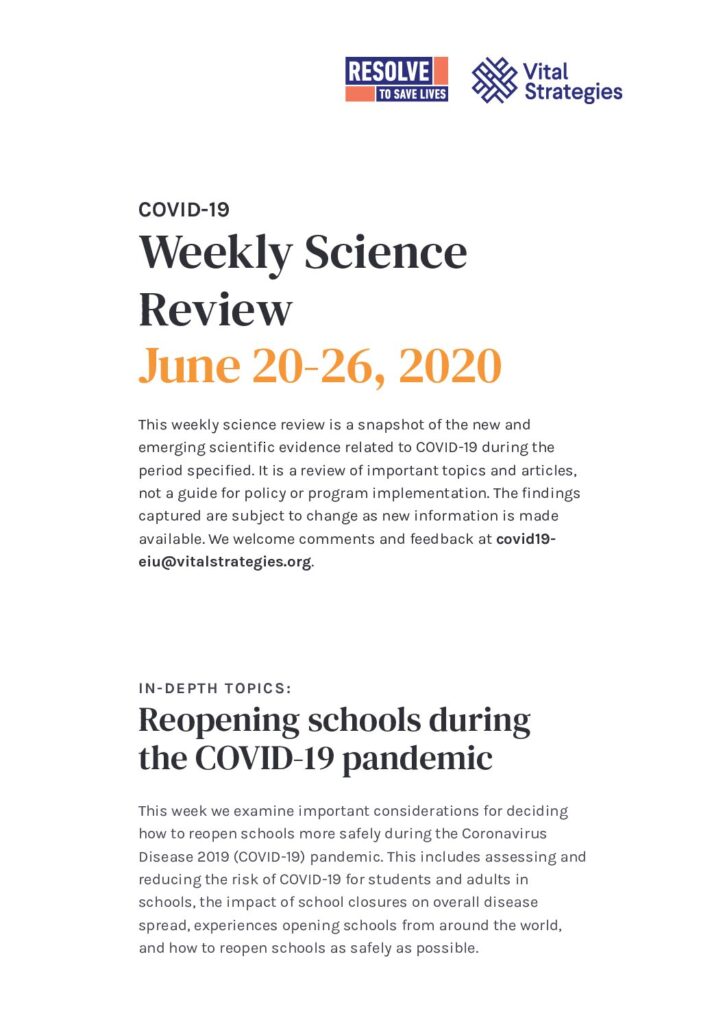
Reopening schools during the COVID-19 pandemic This science review is a snapshot of the new and emerging scientific evidence related to COVID-19 during the period specified. It is a review of important topics and articles, not a guide for policy or program implementation. The findings captured are subject to change as new information is made available.
COVID-19 / In-Depth Science Review: June 13 – 19, 2020
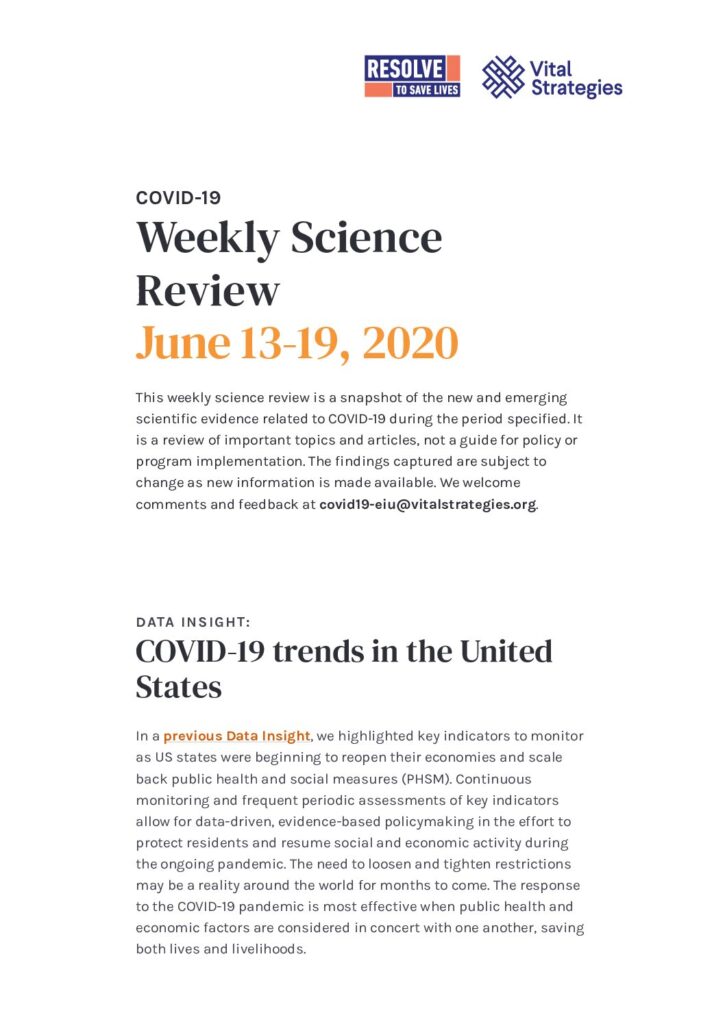
COVID-19 trends in the United States This science review is a snapshot of the new and emerging scientific evidence related to COVID-19 during the period specified. It is a review of important topics and articles, not a guide for policy or program implementation. The findings captured are subject to change as new information is made available.
COVID-19 / In-Depth Science Review: June 6 – 12, 2020
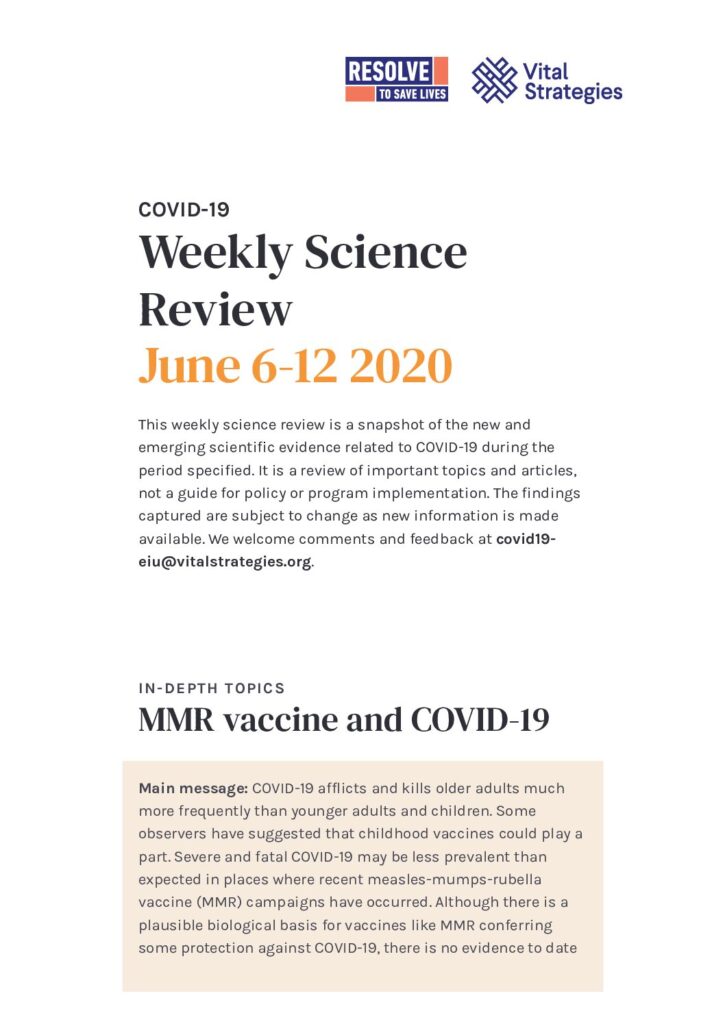
MMR vaccine and COVID-19 This science review is a snapshot of the new and emerging scientific evidence related to COVID-19 during the period specified. It is a review of important topics and articles, not a guide for policy or program implementation. The findings captured are subject to change as new information is made available.
COVID-19 / In-Depth Science Review: May 30 – June 5, 2020
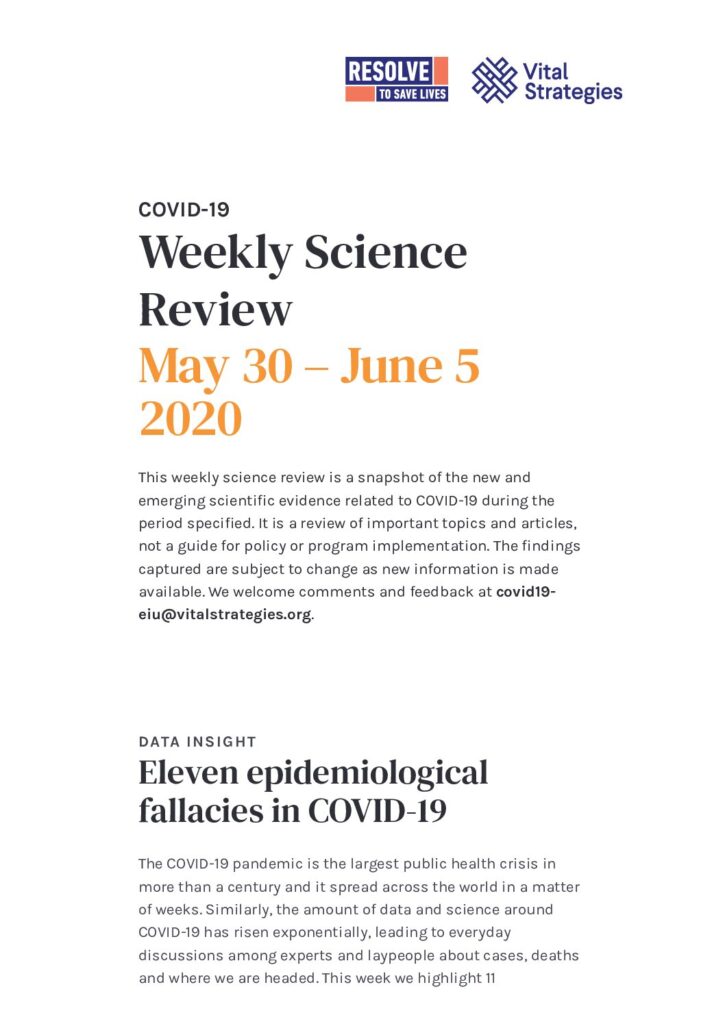
Eleven epidemiological fallacies in COVID-19 This science review is a snapshot of the new and emerging scientific evidence related to COVID-19 during the period specified. It is a review of important topics and articles, not a guide for policy or program implementation. The findings captured are subject to change as new information is made available. See […]
Building National Health Security Through a Rapid Self-Assessment and Annual Operational Plan in Uganda, May to September 2021
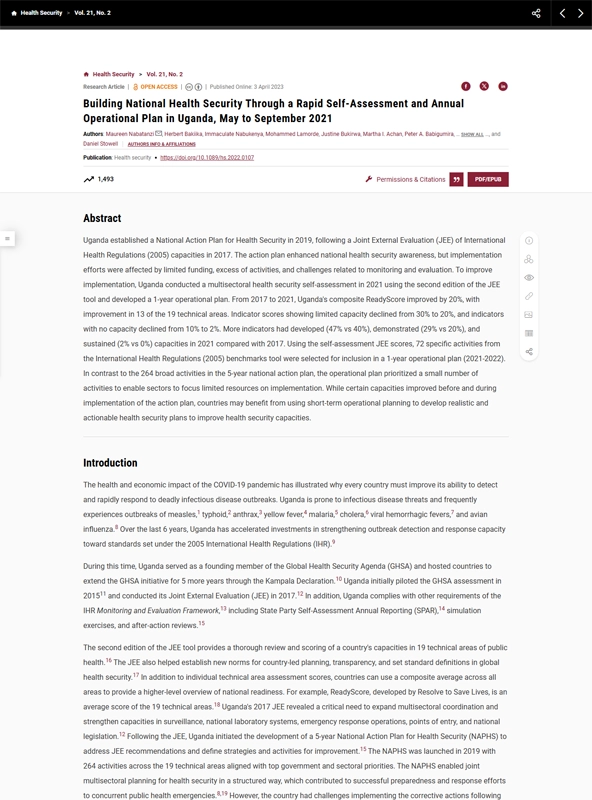
While long-term planning for health security is indispensable, focused short-term operational planning can be a tremendous asset for developing actionable and realistic strategies to improve readiness for public health emergencies. Despite limited funding and an overwhelming list of action items, Uganda successfully enhanced its epidemic readiness by 20% with a focused 1-year operational plan developed […]